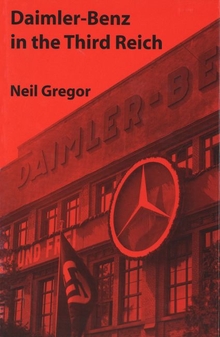Daimler-Benz in the Third Reich
WARNING
You are viewing an older version of the Yalebooks website. Please visit out new website with more updated information and a better user experience: https://www.yalebooks.com
Neil Gregor
Neil Gregor traces the early history of the Daimler-Benz company and examines how opportunities offered by Nazi rearmament in the 1930s led to its rapid expansion and a surge in profits. Focusing mainly on the war years, Gregor demonstrates how the company succeeded in exploiting the demands of the war economy while situating its operations most advantageously for resumption of commercial activity in peacetime. Despite Allied bombing, says Gregor, Daimler-Benz AG emerged from the war in good shape—with a clear operating strategy, a largely intact inventory, and core production lines geared for the peacetime market. With its own interests and preservation as prime motives, the company acquiesced in the exploitation of forced labor, thereby actively intensifying the suffering of civilians, prisoners of war, and Jews and other victims of concentration camps. He concludes that the ability of Daimler-Benz to protect its interests during the war and to manage the transition to peace was predicated upon collusion in the racial barbarism of the Nazi regime.
"A strong addition to our knowledge of the role of big business under the Nazis. Mr. Gregor’s book graphically demonstrates how industry was essential for Hitler’s dreams of conquest. It deserves a place on the shelves with William L. Shirer’s "Rise and Fall of the Third Reich," Primo Levi’s " Survival in Auschwitz" and Arthur D. Morse’s "While Six Million Died." —Herbert Mitgang, New York Times
"Gregor presents the first major study in English of the Daimler-Benz automobile firm in Nazi Germany, drawing on new materials from the Mercedes-Benz archives. . . . He convincingly shows how the automotive manufacturer expanded its profitable production before and especially during the war by moving into aero engines, tanks, and other armament-related sectors. . . . Gregor further demonstrates that self-interest and self-preservation induced Daimler-Benz management to take advantage of the cruel employment of forced labor-prisoners of war, deported civilians, Jews, and concentration camp inmates. [A] readable and thoroughly researched account. A must for all college and university libraries."—G. P. Blum, Choice
"This book is an important addition to the growing body of scholarship on business enterprises during the Nazi dictatorship. Granted unrestricted access to the large and well-ordered company archive of what is now DaimlerChrysler, Neil Gregor has produced a closely documented and analytically penetrating study of how one of Germany's major corporations responded to the policies of the Third Reich. Although it is basically a company history , focused on the economic choices made by management, Gregor employs his findings to address larger issues."—H. A. Turner, American Historical Review
"In the first broad look at auto and armaments manufacturer Daimler-Benz during World War II to appear in English, Gregor . . . examines how the company dealt with the war and its aftermath. . . The author points out that it was irrelevant to Daimler-Benz whom its customers were as long as the company made a profit and that the company cast aside the Nazis as easily as it worked for them. In masterly fashion, Gregor has written a scholarly book based on extensive work in the Daimler-Benz archives. Recommended for any academic library."—Library Journal
"[That] describes a company that unquestioningly threw itself behind Hitler’s war effort while subtly positioning itself for postwar success in a defeated Germany." —Chronicle of Higher Education
"Gregor makes effective use of his unrestricted access to materials in the Mercedes Benz archives and to important collections in archives formerly closely held in East Germany. These new sources and his heavy concentration on decisionmaking within the firm make this book . . . impressive."—Ray Stokes, Business History
"Gregor offers heavyweight history."—Jeremy Black, History Today
"A scholarly and meticulously researched study of a firm that witnessed multiple challenges and transformations—from the 1920s and 1930s, when Daimler Benz dominated the market for mid-sized luxury automobiles, to the companies conversion into a manufacturer of tanks, aircraft parts, and military vehicles. . . . This work stands as one of the most important contributions to our understanding of big business during the Third Reich."—S. Jonathan Wiesen, German Studies Review
"This book is an important addition to the growing body of scholarship on business enterprises during the Nazi dictatorship. Granted unrestricted access to the large and well-ordered company archive of what is now DaimlerChrysler, Neil Gregor has produced a closely documented and analytically penetrating study of how one of Germany's major corporations responded to the policies of the Third Reich. Although it is basically a company history , focused on the economic choices made by management, Gregor employs his findings to address larger issues."—H. A. Turner, American Historical Review
"A clear and convincing interpretation of Daimler’s complicity with the Nazi regime. . . . [This] is an excellent book that throws new light both on the contested history of Daimler-Benz and on central questions in the record of the Third Reich."—J. Adam Tooze, German History
"Gregor’s study is a significant contribution to the history of big business in the Third Reich. . . . Its publication is timely given the current debates about German corporations and demands for compensation from men and women who served as forced and slave laborers during the war."—L. M. Stallbaumer, Holocaust and Genocide Studies
"The book is erudite, cogently argued, clearly written, thoroughly researched and well structured. Its accessible style means that it will also be read outside academic circles. An excellent piece of scholarship, it represents a major contribution to the history of the Third Reich."—Patterns of Prejudice
Publication Date: April 20, 1998
15 b/w









